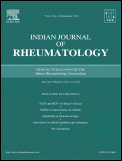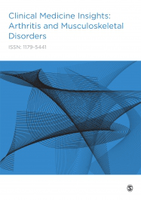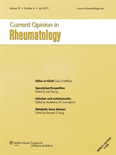
Pediatric Rheumatology
Scope & Guideline
Championing excellence in pediatric rheumatology research and practice.
Introduction
Aims and Scopes
- Clinical Management and Therapeutics:
The journal focuses on clinical studies that evaluate the efficacy and safety of various therapeutic interventions for pediatric rheumatic diseases, including biologics, corticosteroids, and novel therapies. - Epidemiology and Disease Characterization:
Research on the epidemiology, prevalence, and clinical characteristics of pediatric rheumatic conditions, including juvenile idiopathic arthritis and systemic lupus erythematosus, is a core focus. - Pathophysiology and Biomarkers:
Investigations into the underlying mechanisms of pediatric rheumatic diseases, including genetic, immunological, and environmental factors, as well as the identification of biomarkers for diagnosis and treatment response. - Quality of Life and Psychosocial Aspects:
Studies examining the impact of rheumatic diseases on the quality of life, mental health, and social functioning of affected children and adolescents, emphasizing a holistic approach to treatment. - Transitional Care and Long-Term Outcomes:
Research addressing the transition of care from pediatric to adult services, including best practices and outcomes for patients with chronic rheumatic diseases. - International and Multicenter Studies:
The journal promotes studies that involve diverse populations, particularly from underrepresented regions, to enhance the global understanding of pediatric rheumatology.
Trending and Emerging
- Biologic and Targeted Therapies:
There is a growing focus on the efficacy and safety of biologic therapies and targeted treatments for conditions like juvenile idiopathic arthritis and systemic lupus erythematosus, indicating a shift towards personalized medicine. - Mental Health and Psychosocial Impact:
An increasing number of studies are exploring the mental health and psychosocial implications of rheumatic diseases in children, emphasizing the importance of comprehensive care. - Telemedicine and Remote Care:
Research on telemedicine practices has surged, particularly in response to the COVID-19 pandemic, highlighting its role in improving access to care for pediatric patients. - Longitudinal and Transitional Care Studies:
Emerging themes include studies that focus on the long-term management of pediatric rheumatic diseases and the transition from pediatric to adult care, aiming to improve outcomes. - Machine Learning and Data Analytics:
The application of machine learning and data analytics in understanding disease patterns and treatment responses is an emerging trend, reflecting advancements in technology and data utilization. - Health Equity and Access to Care:
Research addressing disparities in access to care and health outcomes among different populations is gaining traction, emphasizing the need for equitable healthcare solutions.
Declining or Waning
- Traditional Diagnostic Methods:
There has been a noticeable reduction in studies focused on traditional diagnostic methods for pediatric rheumatic diseases, as newer, more sophisticated techniques gain prominence. - Single-Symptom Studies:
Research focusing solely on single symptoms or isolated conditions is becoming less frequent, with a shift towards more comprehensive, multi-faceted approaches that consider the interconnectedness of symptoms. - Historical Perspectives:
Papers reflecting on historical practices or outdated treatment modalities are less common, indicating a move towards contemporary and evidence-based practices in pediatric rheumatology. - Case Reports on Rare Conditions:
While case reports are valuable, the frequency of those focusing on exceptionally rare conditions has decreased, suggesting a preference for broader studies with wider applicability. - Basic Science Research:
There appears to be a decline in purely basic science research within pediatric rheumatology, as journals increasingly emphasize translational studies that link laboratory findings to clinical applications.
Similar Journals

SCANDINAVIAN JOURNAL OF RHEUMATOLOGY
Empowering the Rheumatology Community Through ResearchThe Scandinavian Journal of Rheumatology, published by Taylor & Francis Ltd, is a prestigious peer-reviewed journal dedicated to advancing research in the fields of rheumatology, immunology, and related disciplines. With an ISSN of 0300-9742 and an E-ISSN of 1502-7732, this journal has established itself as a vital platform for disseminating significant findings and innovative approaches in the management of rheumatic diseases since its inception in 1959. As a recognized scholarly outlet, it currently resides within the Q2 category for Medicine (miscellaneous) and ranks #39 out of 73 in Rheumatology according to the 2023 Scopus assessments. This reflects the journal's commitment to high-quality research and its relevance in the scientific community. Although it does not provide Open Access options, the journal's rigorous selection process ensures that only the most impactful research reaches its audience, making it a crucial resource for researchers, clinicians, and students engaged in the exploration of rheumatological and immunological challenges. The journal's broad scope encompasses ongoing studies, clinical trials, and reviews that aim to enhance understanding and treatment of rheumatic conditions, promoting collaboration and knowledge-sharing among professionals in the field.

Indian Journal of Rheumatology
Elevating the discourse in rheumatology for better health outcomes.Welcome to the Indian Journal of Rheumatology, a premier scholarly platform dedicated to advancing research and clinical practice in the field of rheumatology. Published by SAGE Publications Inc., this journal has been providing open access to its valuable content since 2006, promoting the dissemination of knowledge in India and beyond. As a voice in the rheumatology community, the journal addresses a wide range of topics including epidemiology, diagnostics, treatment strategies, and patient care in rheumatic diseases. Despite being classified in the Q4 category of the 2023 Scopus rankings, with a current position of Rank #57 among 73 journals, it serves as an essential resource for researchers, healthcare professionals, and students seeking to stay updated with the latest developments. The journal is committed to fostering scholarly dialogue and facilitating access to research that influences practice and improves patient outcomes in rheumatologic care.

Egyptian Rheumatologist
Illuminating the path to improved patient outcomes.The Egyptian Rheumatologist is a peer-reviewed Open Access journal dedicated to advancing the field of rheumatology. Published by Elsevier since 2011, the journal aims to disseminate high-quality research, clinical innovations, and reviews that cover a wide range of topics related to autoimmune diseases, arthritis, and musculoskeletal disorders. With an ISSN of 1110-1164 and an E-ISSN of 2090-2433, it has achieved a respectable rank of #50 out of 73 in the medicine/rheumatology category according to Scopus, positioning it in the 32nd percentile among its peers. Operating from its base in Amsterdam, Netherlands, the journal provides an accessible platform for researchers, professionals, and students, encouraging a collaborative exchange of cutting-edge knowledge that is essential for the ongoing developments in rheumatologic care and research. The Open Access model ensures that critical findings and advancements are available to a global audience, fostering further research and education within this vital field.

Clinical Medicine Insights-Arthritis and Musculoskeletal Disorders
Enhancing patient care with groundbreaking research.Clinical Medicine Insights-Arthritis and Musculoskeletal Disorders, published by SAGE PUBLICATIONS LTD, is an esteemed open-access journal dedicated to advancing knowledge in the field of rheumatology and related immunological disorders. Since its inception in 2008, the journal has provided a platform for researchers and clinicians from around the world to disseminate cutting-edge studies and insights into arthritis and musculoskeletal conditions. Based in New Zealand, this journal has maintained a commendable standing in academic circles, evidenced by its Q3 quartile rankings in both Immunology and Allergy and Rheumatology categories for 2023, alongside respectable Scopus rankings. The journal serves as a vital resource for healthcare professionals, researchers, and students, facilitating enhanced understanding and treatment of musculoskeletal disorders through high-quality research and peer-reviewed articles. With a focus on fostering interdisciplinary collaboration and innovation in the field, Clinical Medicine Insights-Arthritis and Musculoskeletal Disorders is essential reading for those committed to improving patient outcomes and advancing scientific knowledge.

Advances in Rheumatology
Championing excellence in rheumatology research and practice.Advances in Rheumatology is a premier open-access journal published by BMC, dedicated to advancing the field of rheumatology through high-quality, peer-reviewed research. Launched in 2018, the journal has quickly established itself within the academic community, achieving a commendable Q2 ranking in the category of Rheumatology as of 2023 and ranking #34 out of 73 in the Scopus Medicine Rheumatology listings, placing it in the 54th percentile. With a focus on innovative treatments, patient care, and the latest in rheumatological research, the journal provides a platform for researchers and clinicians to disseminate their findings and foster collaborative advancements in this critical area of medicine. Recognized for its accessibility, the journal follows an open-access model, ensuring that research is freely available to a global audience. With a commitment to high standards of academic rigor, Advances in Rheumatology plays a vital role in enhancing the understanding and treatment of rheumatic diseases, making it an invaluable resource for researchers, professionals, and students alike.

CURRENT OPINION IN RHEUMATOLOGY
Fostering Informed Dialogue in RheumatologyCurrent Opinion in Rheumatology, published by Lippincott Williams & Wilkins, stands as a vital resource in the field of rheumatology. Since its inception in 1989, this prestigious journal has been at the forefront of disseminating cutting-edge research, with a notable Q1 ranking in the 2023 Rheumatology category and an impressive Scopus rank of 7 out of 73, placing it in the 91st percentile. The journal's commitment to presenting insightful reviews and critical analyses of recent advancements and treatment strategies makes it an essential read for professionals, researchers, and students dedicated to the study of rheumatic diseases. Although not an open-access journal, Current Opinion in Rheumatology continues to foster an informed dialogue within the academic community through its high-impact content, ensuring that the latest developments and practices are accessible to those at the vanguard of rheumatology research.

Reumatismo
Connecting researchers and practitioners in the world of rheumatology.Reumatismo is a distinguished Open Access journal dedicated to the field of rheumatology, published by PAGEPRESS PUBL since 2001. With a rich history dating back to 1952, this journal has been pivotal in disseminating vital research on rheumatic diseases and related disorders. Based in Italy, Reumatismo has earned a reputation for its quality and relevance, achieving a Q3 category ranking in the 2023 Scopus metrics for Rheumatology, reflecting its significant contributions to the field. The journal is committed to providing a platform for the latest scientific developments and clinical innovations, thus aiding researchers, healthcare professionals, and students striving to enhance understanding and treatment of rheumatic conditions. For those seeking to access comprehensive research articles and studies, Reumatismo boasts an open access policy, ensuring that knowledge is freely available to all, fostering collaboration and advancement in rheumatology worldwide.

Revista Cubana de Reumatologia
Transforming rheumatology through cutting-edge research.Revista Cubana de Reumatologia is a prominent open-access journal published by the SOC CUBANA REUMATOLOGIA, dedicated to advancing knowledge in the field of rheumatology since its inception in 1998. With an ISSN of 1606-5581 and an E-ISSN of 1817-5996, this journal aims to disseminate high-quality research that addresses various aspects of rheumatic diseases, their diagnosis, treatment, and management. Located in Havana, Cuba, the journal serves as a vital platform for both local and international researchers, professionals, and students interested in the latest developments within the specialty. By embracing an open-access policy, the journal ensures that groundbreaking studies are freely available to a global audience, fostering collaboration and innovation in rheumatological research. As the field continues to evolve, Revista Cubana de Reumatologia remains committed to addressing the emerging challenges and trends, making it an essential resource for practitioners and scholars alike.

Current Rheumatology Reviews
Empowering researchers with comprehensive rheumatology insights.Current Rheumatology Reviews is an esteemed journal dedicated to publishing comprehensive reviews on advancements in the field of rheumatology. Established by Bentham Science Publishers, this journal has become a vital resource for researchers, clinicians, and students seeking to stay abreast of the latest developments and therapeutic strategies from 2006 to 2024. Located in the United Arab Emirates, it caters to a global audience, delivering insights that have been pivotal in shaping clinical practices. With an impact factor reflective of its Q3 status in Rheumatology by 2023, the journal ranks #46 out of 73 in the Scopus database, positioning it in the 37th percentile in the discipline. Although it operates without open access, its high-quality content ensures that each article undergoes rigorous peer review, making the Current Rheumatology Reviews a trusted platform for disseminating critical research findings and reviews that drive forward the understanding and treatment of rheumatic diseases.

Journal of Rheumatic Diseases
Shaping the future of rheumatic disease research together.Journal of Rheumatic Diseases, published by the Korean College of Rheumatology, stands as a pivotal platform in the field of rheumatology, contributing significantly to the advancement of knowledge and clinical practice since its inception. With an impact factor reflecting its esteemed position in the academic community, this open-access journal promotes accessibility to high-quality research, ensuring that groundbreaking discoveries are reachable to all stakeholders in the realm of rheumatic diseases. The journal has maintained its commitment to quality, evidenced by its ranking in the Q3 category for Rheumatology in 2023, and its presence among the top quartiles of medical research. Focusing on innovative therapeutic approaches, emerging diagnostic techniques, and comprehensive reviews, the Journal of Rheumatic Diseases seeks to foster collaboration and dialogue among researchers, clinicians, and students alike. For accessibility, the journal offers numerous articles since its transition to open access in 2017, thereby facilitating research dissemination across the globe. As it converges over the years from 2019 to 2024, the journal promises to be instrumental in shaping the future of rheumatic disease research, inviting contributions that inspire new frontiers in this essential field.